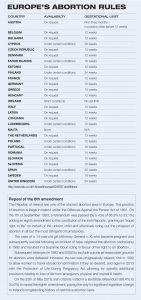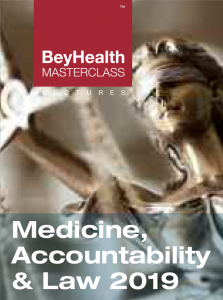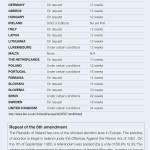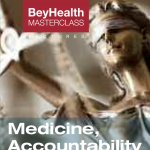
“Any history of malpractice in your family?1”
The vote to repeal restrictive antiabortion laws in a recently concluded referendum in Northern Ireland has rekindled the debate on whether a shift in similarly restrictive laws criminalising the practice of abortion should
occur in other countries such as Nigeria.
Statistics indicate that a quarter of Nigeria’s 9.2 million pregnancies in 2012 were unintended, translating to a figure of approximately 59 unintended pregnancies per 1,000 women between the ages of 15–492.More than half (about 56%) of these unintended pregnancies resulted in induced abortions,32% in unplanned births and 12% in
miscarriages.
Figures from 1996 suggest an estimated 610,000 abortions were performed in Nigeria, compared with a total of 760,000 in 20063. An estimated 1.25 million induced abortions occurred in 2012, equivalent to a rate of 33
abortions per 1000 women aged 15-494. 212,000 women were treated for complications of unsafe abortion in 2012, and an additional 285,000 experienced grave health consequences but were unable to obtain the necessary treatment2.
Unsafe abortion techniques and “backstreet abortions” contribute significantly to the country’s dismal maternal mortality rates5.Analyses of Google searches suggest a greater interest in abortion pills (e.g. Misoprostol) from
countries like Nigeria and Ghana, where abortion laws have historically been more stringent7.
Due to a culture of widespread underreporting,the figures under discussion are unlikely to represent a complete picture of abortion activity. However, there is an unmistakable impression of an upward incidence of abortion in Nigeria.
Abortion law in Nigeria
legal position on abortion in Nigeria is set out in the provisions of its criminal law,comprising effectively – the Criminal Code,applicable in the southern part of the country and the Penal Code, in operation its northern states8. The combined effect of Sections 228,229, and 230 of the Criminal Code is to the effect that any woman who, with intent to procure her own miscarriage unlawfully administers to herself any poison or other
noxious thing or any person who assists her in doing the same is liable to imprisonment for a period ranging from three to fourteen years9.
In like vein, Section 232 of the Penal Code provides, “Whoever causes a woman with child to miscarry shall, if the miscarriage is not caused in good faith for the purpose of saving the life of the woman, be punished with a term of imprisonment which may extend to fourteen years or with fine or both.10”
While the Penal Code provides for an exception to the general provision in the event of a need to preserve life, the provisions of the Criminal Code appear to be more stringent,imposing a complete ban admitting of no exceptions.
said this, the decision of the West African Court of Appeal in R v Edgal11 which followed the English case of R v Bourne12 firmly established that an abortion which is performed to preserve the life of a mother did not constitute a violation of the Criminal Code. Thus, in general, criminalisation of abortion in Nigeria is qualified by situations in which it becomes necessary to preserve the life of the ther.
relatively few cases have been brought on the grounds of abortion, cases such as R v Idiong and Umo13, decided in 1950 by the West African Court of Appeal, indicating the willingness of the courts to enforce the
necessary provisions of the law. The Code of Medical Ethics established by the Medical and Dental Council of Nigeria (MDCN) emphasises the criminal nature of abortion and qualifies it as an act amounting to “infamous conduct” in a professional sense14. Doctors are prohibited from carrying out procedures intended to lead
to abortion (unless within the provision of the law) but are required in each case to provide post-abortion care to individuals who have already undergone such procedures.
Roe v Wade, etc.
Several countries like the United States,Canada, United Kingdom and more recently in the Republic of Ireland have adopted a more liberal approach to abortion law over the last few decades. The journey, navigated over time
through difficult legislative processes and political manoeuvres, has often involved repeated use of referenda, case law and Supreme Court judgements. The case of Roe v Wade15, decided by the US Supreme Court in 1973, ruled that a restriction on abortion was,in fact, a restriction on privacy (hitherto protected by the 14th Amendment) and
affirmed a woman’s right to abortion during the entirety of her pregnancy.
In recent years, some African countries have adopted a similar approach to the question of abortion law. South Africa legalised the practice of abortion through its Choice on Termination of Pregnancy Act, 1996. Ghana, a country which shares a similar colonial history with Nigeria, has modified its abortion laws, expanding its exceptions to include cases in which pregnancy has resulted from rape, incest or defilement of a person deemed (from infancy) to be deficient in mental capacity and therefore incapable of managing their own affairs16.
The pro-life argument regards the foetus as separate, though connected to the life of the mother, and therefore deserving of the legal protection guaranteed by law
In 2013, an anti-domestic violence law (initially enacted in the Imo State, Nigeria in 2012) containing provisions allowing abortion in similar circumstances was repealed by the Governor amidst strong protest17. An earlier attempt (in 1982) to make Nigeria’s abortion laws less stringent was also rejected, with very few public supporters of a bill presented by the Society of Obstetricians and Gynaecologists, which sought to make abortion legal in specific circumstances18.
Anti-abortion law –to be or not to be
Should the law continue to insist on a restrictive approach to the question of abortion in Nigeria despite its well-documented high rate of abortion and associated levels of maternal morbidity and mortality? The same argument
has been applied to good effect by pro-choice campaigners in several jurisdictions around the world.
The practice of abortion, it may be argued, is generally safe when performed by qualified health care providers with the appropriate skills, equipment and standards. Indeed, related mortality rates in countries where women have access to safe abortion services are considerably low. Proponents of the decriminalisation argument have long
argued that since the law has proven ineffective in preventing the thousands of abortions conducted in unsafe clandestine establishments, perhaps the time has come to consider an alternative course of action by legalising (and regulating) the performance of abortion practices across Nigeria.
The argument further rests on the primacy of autonomy due to the woman in question, enshrined in their legal right to privacy under the Constitution of the Federal Republic of Nigeria, 1999 (section 37). It is contended that a woman, as an autonomous person, has a right to determine what she does or desires to be done with her body and that denial of the right to abortion amounts to an emasculation of that right. Emphasis is thus placed not only upon the physical and psychological demands of a state of pregnancy but also on the sacrificial requirements of motherhood and the need to ensure that such responsibilities, desirable as they might be in certain circumstances, ought not to be imposed upon the individual against their will19.
Pro-life campaigners challenge the autonomy argument on the grounds of the need to protect living beings, including fetuses.The main argument in this regard is that,regardless of how the life has come to be, it is
to be regarded as separate though connected to the life of the mother and therefore deserving of the legal protection guaranteed by law.
Autonomy, identity and ‘personhood’
Anti-abortion activists argue that biologically,there is no contention as to the distinctive identity of the fetus. While the sperm and the egg released by a man and a woman respectively bear their genetic identity, a fusion
of both sex cells produces a genetically distinct entity which in a strictly biological sense is neither a part of the man nor the woman.
Clearly, the fetus relies upon the resources of the mother for nourishment and immediate survival. However, it is not to be considered an extension of her body as its genetic composition is regarded as different from the
mother’s. The implication of this argument is that of a whole person – a new and vulnerable life, with a distinctive identity and deserving of life and protection.
Section 307 of the Nigerian Criminal Code provides that a child becomes “a person capable of being killed when it has completely proceeded in a living state from the body of its mother, whether it has breathed or not, and
whether it has an independent circulation or not, and whether the navel-string is severed or not”. However, provisions of any statute must not be read in isolation. Section 309 of the Criminal Code is also worthy of note. It provides that “when a child dies in consequence of an act done or omitted to be done by any person before or during its birth, the person who did or omitted to do such an act is deemed to have killed the child”.
Reading the latter provision in conjunction with the former, it may be deduced that since the law prohibits the killing of a child before its birth, at which point it cannot be said to have “completely proceeded in a living state from the body of its mother”, the law (albeit circuitously), ultimately recognises the personhood of the
unborn fetus.
Contradiction and a question of ‘degrees’
The considerations outlined in earlier paragraphs, however, do appear to raise a point of contradiction in the interpretation of the law – in recognising the personhood of a fetus, why does its punishment of abortion practices, which according to existing criminal law ranges from three to fourteen years, differ from the
capital sentence passed in more conventional cases of murder? Furthermore, does the substantial difference in punishment suggest a distinction in the “degrees” of personhood (or severity of “offence”) or does the law in fact
(perhaps unwittingly), betray a certain double standard in its unbending position on the matter of abortion?
Apart from the legal arguments that prevail in the discussion for and against the right to abortion, there are essential sociocultural considerations of note in a religious (and socially conservative) society such as Nigeria.
These include that children are a divine gift, that children are a blessing and that life is sacred; that all life begins at conception, that miscarriages are a tragic occurrence and that abortion constitutes the termination of life by an individual with no moral or ethical right to assume such privilege.
While this may seem somewhat hypocritical given the significant rates of unsafe (including fatal) abortion practices occurring around the country, these beliefs represent the valid consensus viewpoint of vast sections of
Nigerian society. A common rationalisation in the minds of many is the firm and honest belief that decriminalising the subject of abortion amounts effectively to an act legitimising its practice. The strength of opposition to more
recent efforts to enact pro-abortion laws reflects the attitude of society to the question of where the law should stand in relation to abortion practices.

Addressing root causes
Regardless of the position one might adopt on the present status of the law on abortion, it is the view of many that several important issues on the subject have so far been neglected. The first of these, of course, must be the question – “Why do we have such high rates of abortion in the first place?” This question is perhaps readily answered as follows, “…because Nigeria has a high rate of unwanted pregnancies”. The second question follows naturally from the first – “Why do we have a high rate of unwanted pregnancies?” The third question – “What can we do to limit the high rate of unwanted pregnancies?”
The high rate of unwanted pregnancies,and consequently the rising number of abortions recorded in Nigeria, are almost inextricably linked with a low-level uptake of (or access to) contraception services. Population studies have shown that only 16% of women of reproductive age were using any form of contraception in 2013 and only 11% of this (16%) cohort was using a modern method of contraception20.
This fact also provides considerable insight into some of the critical reasons for significant abortion rates amongst married and unmarried women. Oye-Adeniran et al. (1987) list issues of a short birth interval, the high cost of raising children, interruption of education and unmarried status as the most common reasons for unwanted pregnancies.21’22 The study demonstrated a persistent disparity between knowledge and (actual) use of contraception
and highlights significantly low rates of contraception-use (23.4%) among women with a history of unwanted pregnancies. It concludes that increased usage will reduce the risk of unwanted pregnancy and subsequent induced abortion.
Recommendations
The law in Nigeria does not currently make provision for abortion except in the (restricted) event that it is necessary to save the life of the mother. The current sociocultural context in Nigeria does not support a change to the law on abortion at this stage. A pragmatic approach must, therefore, be sought to address identified causes as follows:
1. Improve public awareness and uptake of contraceptive services among women of childbearing age – The law can contribute towards this by including the provision of contraceptive procedures and devices in the basic minimum package of health care services to which a Nigerian is entitled under Section 3 of the National Health Act. The corresponding provision should also be made within state-level health insurance programmes.
2. The Child Rights Act should ideally be amended to include a requirement for sex education in all (public and private) schools – This should form part of a sustained public health campaign to reduce stigmatisation of unmarried mothers and provide better support structures for adoption services nationwide23.
3. Provision of counselling and support centres where women (and girls) can receive support from trained personnel in a non-judgemental manner – this includes pregnancy crisis centres and sexual assault referral centres with facilities to provide contraception and pre-exposure prophylaxis for HIV. At present, very little policy or legal support exists for such centres.

In conclusion
Abortion law in Nigeria is likely to remain controversial in the years ahead. However, both pro-choice and anti-abortion proponents can make significant efforts to reduce the incidence of (safe and unsafe) abortion in Nigeria. If it remains expedient to maintain the existing stance on abortion as set out in the criminal law, then provision should be made to encourage an environment conducive for its reduction across the country.
Disclosure forms provided by the author are available at NEJM.org.
Editor’s note:
Author Affiliations
Supplementary Material
| Disclosure Forms | 83KB |
Add your Comment
Add your Comment
Leave a Reply
You must be logged in to post a comment.
BHQJ 2018 ; 001:34-36
Related Article 
Medical Negligence & the Law5th May 2018 . Atrogenic harm is a matter of significant concern in Nigeria admin
Colorectal Cancer Overview5th May 2018 . [dkpdf-columns columns="3" equal-columns="false" gap="10"] Introduction Colorectal cancer is a major admin
Funding Healthcare Services in Nigeria – A conundrum of demand, policy and supply!5th May 2018 . [dkpdf-columns columns="3" equal-columns="false" gap="10"] Doctor, I happy say na you admin
5 “Provocations” of Healthcare Quality Reform6th May 2018 . [dkpdf-columns columns="3" equal-columns="false" gap="10"] n the four decades since he admin
Health Insurance, Activism & Urgent Change6th May 2018 . [dkpdf-columns columns="3" equal-columns="false" gap="10"] AR: Dr Soyinka, it’s wonderful to admin
Anne Olowu talks about her “Masterclass” experience6th May 2018 . [dkpdf-columns columns="3" equal-columns="false" gap="10"] As I suspect is the case admin
Stomach & Oesophageal Cancer in Nigeria6th May 2018 . [dkpdf-columns columns="3" equal-columns="false" gap="10"] Gastric and Oesophageal (Upper GI) cancers admin
Setting out the Stall!7th May 2018 . [dkpdf-columns columns="3" equal-columns="false" gap="10"] "The drawbacks of our false knowledge admin






Leave a Reply
You must be logged in to post a comment.